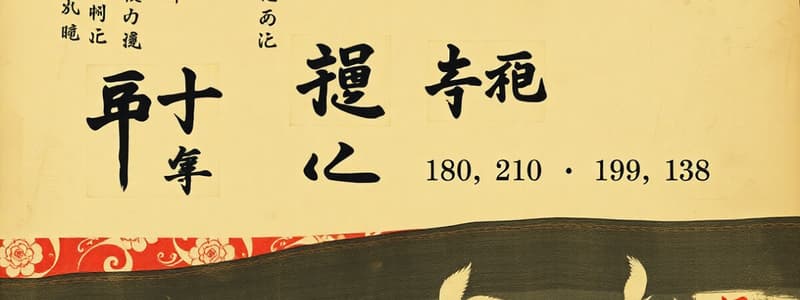Podcast
Questions and Answers
“是”的用法在哪里正确?
“是”的用法在哪里正确?
- 表示过去时态
- 连接名词与动词
- 连接两个名词 (correct)
- 表示否定情态
在对话中,B 说“我叫张丽娜,_____?”的合适填空是什么?
在对话中,B 说“我叫张丽娜,_____?”的合适填空是什么?
- 我是谁
- 谁是你
- 你叫什么名字 (correct)
- 你认识我吗
句子“我认识小明”的正确翻译是?
句子“我认识小明”的正确翻译是?
- I have Xiao Ming
- I am Xiao Ming
- I know Xiao Ming (correct)
- I meet Xiao Ming
在句子“你妈妈是谁?”中,正确理解“谁”的是?
在句子“你妈妈是谁?”中,正确理解“谁”的是?
在句子“我也认识你”中,“也”的作用是什么?
在句子“我也认识你”中,“也”的作用是什么?
‘吗’在句子中的作用是什么?
‘吗’在句子中的作用是什么?
‘很’的主要意思是什么?
‘很’的主要意思是什么?
‘你很可爱’的意思是什么?
‘你很可爱’的意思是什么?
‘叫’这个词的意思是什么?
‘叫’这个词的意思是什么?
句子‘我爱你’转变为疑问句后应如何表达?
句子‘我爱你’转变为疑问句后应如何表达?
‘什么’在句子中通常用来表示什么?
‘什么’在句子中通常用来表示什么?
‘我叫娜娜’中‘我’的意思是什么?
‘我叫娜娜’中‘我’的意思是什么?
下面哪个结构是正确使用‘很’的?
下面哪个结构是正确使用‘很’的?
当你问‘你叫什么名字?’时,想要了解什么?
当你问‘你叫什么名字?’时,想要了解什么?
“也”的意思是什么?
“也”的意思是什么?
根据句子“这栋房子很老”,可以推断出什么?
根据句子“这栋房子很老”,可以推断出什么?
在对话中回应“你好吗?”时,应该怎么回答?
在对话中回应“你好吗?”时,应该怎么回答?
“谢谢”在中文中的意思是什么?
“谢谢”在中文中的意思是什么?
“呢”这个词通常在句子的什么位置出现?
“呢”这个词通常在句子的什么位置出现?
当你想表达“我爱你”的时候,可以使用哪个句子?
当你想表达“我爱你”的时候,可以使用哪个句子?
“认识你很高兴”的意思是什么?
“认识你很高兴”的意思是什么?
在对话中,A说“我是谁?” B应该怎么回答?
在对话中,A说“我是谁?” B应该怎么回答?
日期的中文如何表达?
日期的中文如何表达?
“号”和“日”有什么区别?
“号”和“日”有什么区别?
如果今天是4月3日,确认明天的日期应为:
如果今天是4月3日,确认明天的日期应为:
在中文中凡是1到31号的日期,通常会用哪个词来表示?
在中文中凡是1到31号的日期,通常会用哪个词来表示?
以下哪个月是正确的中文表达?
以下哪个月是正确的中文表达?
每个星期几的中文表示哪个是正确的?
每个星期几的中文表示哪个是正确的?
下面哪个日期表达的中文是错误的?
下面哪个日期表达的中文是错误的?
年份在中文中表示时,通常采用哪种格式?
年份在中文中表示时,通常采用哪种格式?
在中文中,星期一是怎样表示的?
在中文中,星期一是怎样表示的?
下列日期中,哪个用于表示“今天”?
下列日期中,哪个用于表示“今天”?
Flashcards
打招呼 (dǎ zhāo hū)
打招呼 (dǎ zhāo hū)
用于表达问候,意为“你好” 或 “您好”。
您 (nín)
您 (nín)
意思是“您”,比“你”更尊敬,用于称呼比自己年长或地位较高的人。
吗 (ma)
吗 (ma)
是疑问句的标志,相当于汉语的“吗”。
很 (hěn)
很 (hěn)
Signup and view all the flashcards
很 + 形容词/动词
很 + 形容词/动词
Signup and view all the flashcards
也
也
Signup and view all the flashcards
谢谢
谢谢
Signup and view all the flashcards
呢
呢
Signup and view all the flashcards
你好
你好
Signup and view all the flashcards
认识你很高兴
认识你很高兴
Signup and view all the flashcards
他
他
Signup and view all the flashcards
爱
爱
Signup and view all the flashcards
我
我
Signup and view all the flashcards
叫 (jiào)
叫 (jiào)
Signup and view all the flashcards
什么 (shén me)
什么 (shén me)
Signup and view all the flashcards
名字 (míng zi)
名字 (míng zi)
Signup and view all the flashcards
认识 (rèn shì)
认识 (rèn shì)
Signup and view all the flashcards
高兴 (gāo xìng)
高兴 (gāo xìng)
Signup and view all the flashcards
是 (shì)
是 (shì)
Signup and view all the flashcards
你叫什么名字? (nǐ jiào shénme míngzi?)
你叫什么名字? (nǐ jiào shénme míngzi?)
Signup and view all the flashcards
我 (wǒ) 也 是 (yě shì)
我 (wǒ) 也 是 (yě shì)
Signup and view all the flashcards
认 识 你 很 高 兴 (rèn shì nǐ hěn gāo xìng)
认 识 你 很 高 兴 (rèn shì nǐ hěn gāo xìng)
Signup and view all the flashcards
昨天 (zuó tiān)
昨天 (zuó tiān)
Signup and view all the flashcards
今天 (jīn tiān)
今天 (jīn tiān)
Signup and view all the flashcards
明天 (míng tiān)
明天 (míng tiān)
Signup and view all the flashcards
日 (rì)
日 (rì)
Signup and view all the flashcards
月 (yuè)
月 (yuè)
Signup and view all the flashcards
年 (nián)
年 (nián)
Signup and view all the flashcards
星期 (xīngqī)
星期 (xīngqī)
Signup and view all the flashcards
几 (jǐ)
几 (jǐ)
Signup and view all the flashcards
号 (hào)
号 (hào)
Signup and view all the flashcards
信封 (xìn fēng)
信封 (xìn fēng)
Signup and view all the flashcards
Study Notes
Lesson 2: Greetings
- The lesson covers greetings in Mandarin Chinese.
- "Nǐ hǎo" (你好) means "hello" (used when addressing someone as an equal).
- "Nín hǎo" (您好) means "hello" (used when addressing someone older or of higher status).
- "Xīn" (心) means "heart" in Mandarin Chinese.
- "Nǐ hǎo ma" (你好吗?) means "how are you?".
Lesson 3: Expressing Happiness
- The lesson covers ways to express happiness in Mandarin.
- "Gāo xìng" (高兴) means "happy" or "pleased". This is a common way to express happiness
Lesson 4: Talking about Dates/Time
- Discusses ways to ask and reply to questions about dates and times in Mandarin.
- "Rì qī" (日期) means "date".
- "Yuè" (月) means "month".
- "Hào" (号) means "day of the month".
- "Zuó tiān" (昨天) means "yesterday".
- "Jīn tiān" (今天) means "today".
- "Míng tiān" (明天) means "tomorrow".
Lesson 5: Numbers
- This lesson discusses numbers in Mandarin.
- The numbers zero through ten are listed.
Lesson 6: Days of the Week
- The lesson provides the days of the week in Mandarin.
- Examples of days of the week are given in a conversational context.
Lesson 7: Using "几" (Jǐ) to ask "How Many"
- "Jǐ" (几) is used to ask "how many".
- It's used with days, months and weeks.
Lesson 8: Addresses
- The lesson covers how to write an address (in Mandarin).
- includes the concept of provinces, cities, neighborhoods and specific locations.
Lesson 9: Formal Greetings and Introductions
- The lesson covers using more formal ways to greet others.
- "Rèn shì nǐ hěn gāo xìng" (认识你很高兴) means "I'm glad to meet you".
Lesson 10: Introductions Using "Jiào" (叫)
- "Jiào" (叫) means "to call, to name".
- It can be used for both self-introduction and asking for someone's name.
Lesson 11: Questions with "Shén me" (什么)
- "Shén me" (什么) means "what".
- It's used when asking questions about names and other information.
Lesson 12: Using "shì" (是) for "to be"
- "Shì" is the verb for "to be" and is used to connect items and to form statements.
Studying That Suits You
Use AI to generate personalized quizzes and flashcards to suit your learning preferences.




